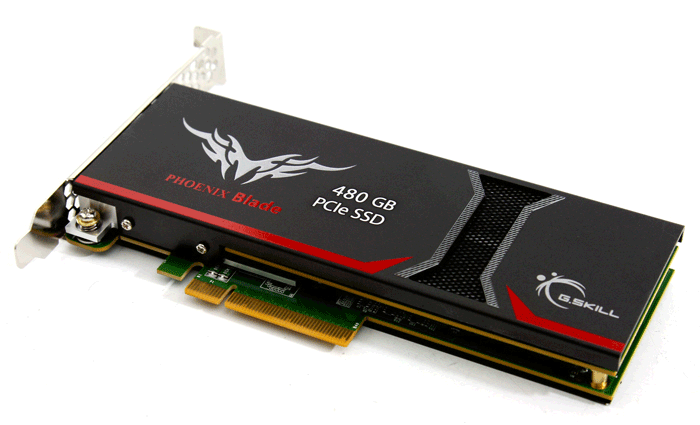Introduction
Going From 0 To 1,950 MB In A Split Second...
We'll be testing the GSKILL Phoenix Blade PCIe SSD today. Let me just quickly throw some numbers at you that will bring a smile to your face, so how does 2,000 MB/s maximum read and write performance sound? Yes Sir, or 245K IOPS? Yep - that's the kind of performance GSKILL offers to the performance aficionados in the year 2014.
The world of Solid State storage technology is full of surprises and the development rate is exceedingly progressive. Last year it however turned from a growth market towards a steady market where only the big players have a real saying. Names like Micron (Crucial), Samsung, Intel and Toshiba (OCZ) will be the brands to keep an eye on. The development rate however has been going so fast that current component technology cannot keep up with the pace. The transition to SATA 3 (6G) was huge, but the minute SATA 3 was released (offering 6 Gbps transfers) these controllers already started reaching their maximum bandwidth with the latest generation SSDs. Starting with Z97 you'll be seeing a lot of M2 products, basically offering a 10 Gbps link directly from your chipset (PCIe) and later on in the year 10 Gbps Sata Express will become a thing of discussion. So basically you will see three things trending this year, slightly faster SSDs (but these are bottlenecked due to SATA3), then you'll see the M2 devices (these will become very popular due to ease of installation versus performance), and the last trend will be a series of new PCI Express based SSD solutions. Recently we tested a couple already like the OCZ RevoDrive series, Plextor, MX-Extreme all fun stuff.
Today we however take a look at a PCIe based SSD. The GSKILL Phoenix Blade SSD is a RAID 0 solid state drive which slips into a x8 PCIe 2.0 slot of your PC. The bare essence of the product is to put multiple SSD clusters into one product. The NAND flash memory is tied to SandForce 2281 multi-channel controllers, these controllers then lead towards another controller, a RAID controller. Combined that RAID 0 array is throwing ghastly numbers over the PCIe express bus, instead of that limiting SATA connector. With 19 nm Toshiba NAND flash, SandForce controllers and a RAID solution from GSKILL, this product is about to break a record or two when it comes to performance.
Let me just throw some numbers at you to get that tickle in your belly; 2,000 MB/s maximum read performance, or what about 2,000 MB/s maximum write performance? Insanely fast, but sure very expensive as well. Have a peek before we dive into the architecture behind the Phoenix Blade PCIe SSD, and then put the pedal to the metal, we'll rise like a phoenix.


